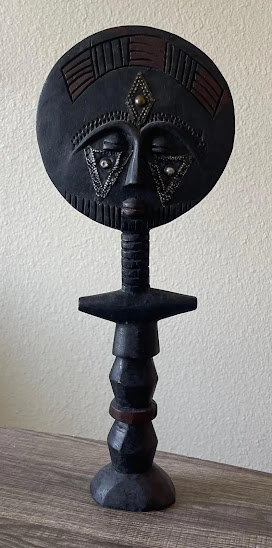From Ashanti Kingdoms to Modern Homes: The Origins of Akuaba
The Akuaba doll originates from the Ashanti people of Ghana, a powerful and historically significant ethnic group known for their rich artistic traditions and intricate social structures. "Akuaba" literally translates to "Akua's child," and the most common narrative for their creation stems from a legend. It is said that a woman named Akua was struggling to conceive. Following the advice of a traditional healer, she commissioned and cared for a wooden doll as if it were her own child. When she eventually gave birth to a beautiful baby girl, the practice of carving and caring for these dolls as a means to encourage fertility spread throughout the Ashanti community.
While the legend highlights their primary purpose, Akuaba dolls are more than just fertility charms. They also served as educational tools, teaching young girls about childcare and the responsibilities of motherhood.
The Distinctive Beauty: Anatomy of an Akuaba Doll
What makes an Akuaba doll so recognizable? Their striking, abstract design is truly unique. You'll typically find:
- A large, flat, disc-shaped head: This is arguably the most iconic feature, symbolizing the beauty and health of a child, and in some interpretations, the wisdom of a woman.
- A ringed neck: These rings represent rolls of fat, signifying prosperity, health, and a well-fed child.
- Stylized body and limbs: Often minimalistic, the body is typically columnar with rudimentary arms, emphasizing the head and neck as the doll's most important features.
- Smooth, dark wood: Traditionally carved from specific types of wood, often mahogany or sese, they are meticulously polished to a smooth, dark sheen, giving them a timeless elegance.
Beyond Fertility: The Purpose and Use
While fertility is the cornerstone of their use, Akuaba dolls held a broader significance in Ashanti society:
- Conception and Pregnancy: Their primary role was to assist women in conceiving and to ensure a healthy pregnancy and delivery. Women would carry the dolls on their backs, just as they would a real baby, and care for them meticulously.
- Child Rearing: Young girls would play with Akuaba dolls, learning the routines and responsibilities of motherhood, preparing them for their future roles.
- Amulets of Good Fortune: Beyond fertility, the dolls were seen as general symbols of good fortune, well-being, and beauty, bringing positive energy to the home.
Why Collect an Akuaba Doll Today?
So, why would someone in the 21st century want to own an Akuaba doll? The reasons are as diverse as the dolls themselves:
- A Symbol of Hope and New Beginnings: For those hoping to start or expand their families, an Akuaba doll can serve as a beautiful and tangible symbol of hope, intention, and positive energy.
- An Appreciation for African Art: Beyond their symbolic meaning, Akuaba dolls are stunning examples of traditional African artistry. Their minimalist yet powerful aesthetic makes them captivating decorative pieces for any home, adding a touch of global culture and history.
- A Connection to Ancestral Wisdom: Owning an Akuaba doll is like holding a piece of history in your hands. It connects you to the ancient traditions, beliefs, and wisdom of the Ashanti people, offering a glimpse into a rich cultural heritage.
- A Unique and Meaningful Gift: Looking for a thoughtful and distinctive gift? An Akuaba doll, especially for someone starting a family or who appreciates world art, is a truly meaningful present that carries a beautiful story.
- Supporting Artisanal Traditions: By purchasing an authentic Akuaba doll, you're also supporting the continuation of traditional carving skills and the livelihoods of artisans in Ghana.
Discover Your Own Akuaba Story
Each Akuaba doll has its own subtle variations, making every piece unique. They are more than just decorative objects; they are conduits of history, hope, and artistic expression. If you've been drawn to the elegance and story of these remarkable dolls, I invite you to explore the Akuaba fertility doll I currently have available in my Etsy shop. Bring a piece of Ghanaian legacy, and perhaps a touch of its powerful symbolism, into your own home.
Carolina Dean


No comments:
Post a Comment